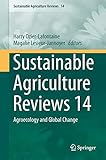Sustainable agriculture reviews 14: agroecology and global change / Harry Ozier-Lafontaine, Magalie Lesueur-Jannoyer, editors
Ozier Lafontaine, Harry [editor] | Lesueur Jannoyer, Magalie [editor/a].
Tipo de material: Libro
impreso(a)
y electrónico
Series Editor: New York: Springer International Publishing, c2014Descripción: xiv, 511 páginas : fotografías, ilustraciones, mapas, retratos ; 24 centímetros.ISBN: 3319060155; 9783319060156.Tema(s): Agroecología
Libro
impreso(a)
y electrónico
Series Editor: New York: Springer International Publishing, c2014Descripción: xiv, 511 páginas : fotografías, ilustraciones, mapas, retratos ; 24 centímetros.ISBN: 3319060155; 9783319060156.Tema(s): Agroecología| Tipo de ítem | Biblioteca actual | Colección | Signatura | Estado | Fecha de vencimiento | Código de barras |
|---|---|---|---|---|---|---|
| Libros | Biblioteca Electrónica Recursos en línea (RE) | Acervo General | Recurso digital | ECO400577762656 | ||
| Libros |
Biblioteca San Cristóbal
Texto en la configuración de la biblioteca San Cristóbal |
Acervo General | 630.2745 A38 | Disponible | ECO010018523 |
Incluye bibliografía e índice: páginas 509-511
Agroecology Theory, Controversy and Governance.. Food and Energy Production from Biomass in an Integrated Farming System.. Ecological Intensification for Crop Protection.. Livestock Farming Systems and Agroecology in the Tropics.. Cropping Systems to Improve Soil Biodiversity and Ecosystem Services: The Outlook and Lines of Research.. Agroecology and Grassland Intensification in the Caribbean.. Ecosystem Services of Multispecific and Multistratified Cropping Systems.. Agroecological Engineering to Biocontrol Soil Pests for Crop Health.. Agroecological Resources for Sustainable Livestock Farming in the Humid Tropics.. Agroecology for Farmers: The Linguistic Issue.. Soil Quality and Plant Nutrition.. Plant Nutrition: From Liquid Medium to Micro-farm.. Index
Disponible para usuarios de ECOSUR con su clave de acceso
Sustainable agriculture is a rapidly growing field aiming at producing food and energy in a sustainable way for humans and their children. Sustainable agriculture is a discipline that addresses current issues such as climate change, increasing food and fuel prices, poor-nation starvation, rich-nation obesity, water pollution, soil erosion, fertility loss, pest control, and biodiversity depletion. Novel, environmentally-friendly solutions are proposed based on integrated knowledge from sciences as diverse as agronomy, soil science, molecular biology, chemistry, toxicology, ecology, economy, and social sciences. Indeed, sustainable agriculture decipher mechanisms of processes that occur from the molecular level to the farming system to the global level at time scales ranging from seconds to centuries. For that, scientists use the system approach that involves studying components and interactions of a whole system to address scientific, economic and social issues. In that respect, sustainable agriculture is not a classical, narrow science. Instead of solving problems using the classical painkiller approach that treats only negative impacts, sustainable agriculture treats problem sources. Because most actual society issues are now intertwined, global, and fast-developing, sustainable agriculture will bring solutions to build a safer world. eng
Disponible en línea
Disponible en formato PDF
Subscripción a EBSCOhost Julio del 2016
